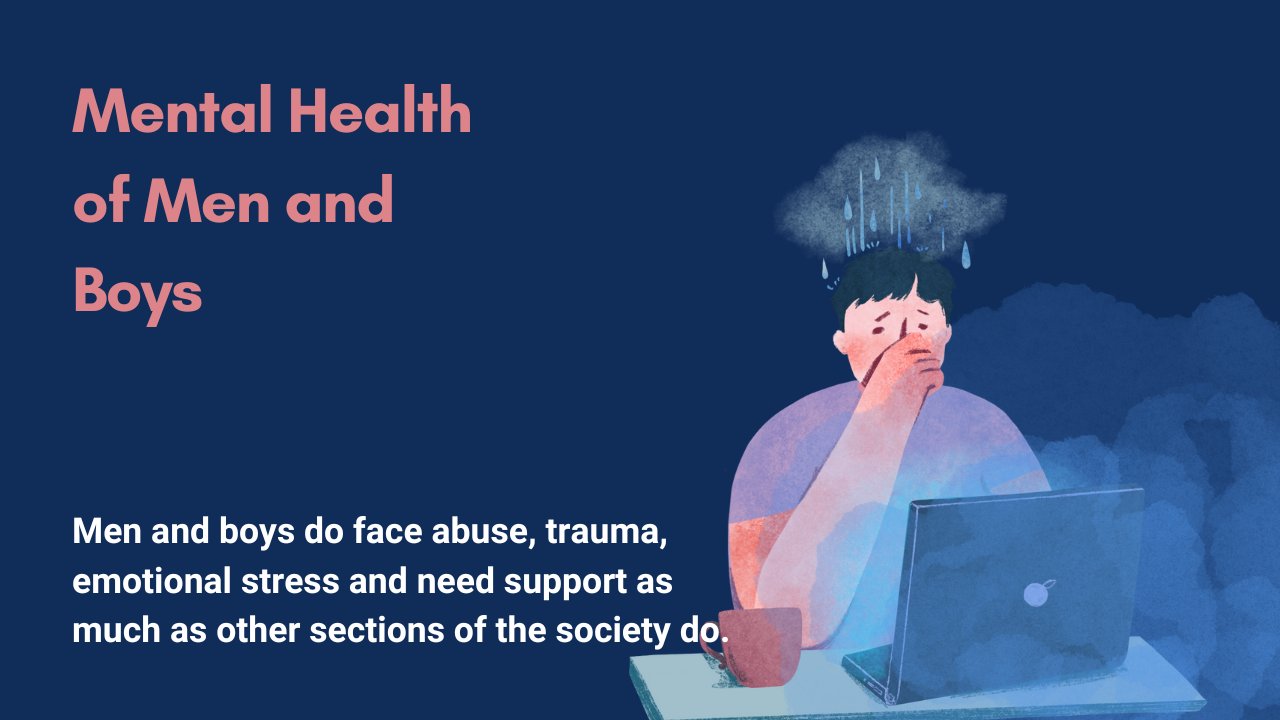
Myths are an integral part of every society and Indian society is no exception. Myths that I usually come across are- women can’t be good drivers, they can’t pursue careers in intellectually demanding streams like science, technology, engineering and mathematics and the list goes on.
A myth of the similar nature is that men and boys do not face mental health issues. The reality is otherwise. Men and boys do face abuse, trauma, emotional stress and need support as much as other sections of the society do.
According to research published in the Indian Journal of Community Medicine conducted in Haryana in 2018, 52.4 percent of men had faced gender-based violence. Research shows 57.3 percent of boys have faced sexual abuse. To understand the agony of sexual abuse of boys one can watch the Satyamev Jayate season 1 episode 2, that narrates the detailed ordeal of a victim of child sexual abuse. The major issue involved is that even though a huge population of men and boys face abuse, trauma, emotional stress, the number of them who seek care is far too low.
Global research shows that men are less likely to seek help as taking help or accepting their issues in public will render them as ‘weak’, a trait not very much accepted in a patriarchal society fed by masculine subcultures. While I put forth the issues of mental health of men and boys, I want to reiterate that we stand firm with the decade’s long initiatives and meticulously crafted laws that have led to women empowerment and helped millions of women in distress. When we talk about the rights of men and boys, they must not automatically assume to be antithetical to the rights of women. The fight to ensure the rights of each gender must be in sync to an extent possible.
Coming back to our discourse on Mental health of men and boys, I will cover six most important signs in the following section.
Five Signs to spot depression in Men and Boys
1. Consumption of Alcohol and drugs
Consuming alcohol in moderation is part of a modern lifestyle these days. But if you find that your son, brother, husband or friend has lately started consuming unusually high amount of alcohol or switched to drugs there may be a strong case that not everything is going well with him.
2. Avoiding family interactions or social gatherings, festivals etc.
This means that they are not enjoying things that they earlier enjoyed in the past. There is strong evidence that something has drastically changed in their lives pushing them to seek unhealthy loneliness.
3. Obsessive indulgence in office or work without taking proper breaks.
By unhealthy indulgence in livelihood related work they are trying hard to avoid or skip the present mental turmoil. However, this over indulgence never solves their issues. On the contrary it impacts their physical health and deteriorates their already worsening mental health in the long run.
4. Becoming more controlling or abusive in relationships.
As part of our cultural upbringing we men and boys lack an emotional vocabulary to communicate our feelings. Hence, we rarely identify with the words like compassion, generosity and kindness. So, when we face anxiety and depression we chose violence, control and abuse to express it.
5. Engaging in risk-taking behaviour, such as unsafe sex or rash driving etc.
Risk taking behaviour is based on the idea of self-harm, a very prominent symptom of mental illness.
Why depression is often undiagnosed in Men and Boys?
Men usually report physical symptoms, such as difficulty sleeping, irritable bowel syndrome, back pain etc rather than emotional changes because as a cultural norm they need not be ‘too emotional’. Moreover, they lack emotional vocabulary as part of their cultural upbringing to express their emotional state of mind. For instance, we may rarely hear men and boys saying that they feel stressed, anxious or depressed, as these expressions are not a part of their social and cultural identity.
As a result, the doctor might give them the wrong diagnosis. Also, people may misinterpret common emotional or behavioural signs of depression in men. They may see anger as a personality trait instead of a sign of depression leaving them isolated in social spaces.
Hence our medium of expression of mental health issues can be very deceptive to narrow down on the core reasons of why we are doing, whatever we are doing.
As Boys and Men age, they witness a shrinking social network due to increased financial and professional commitments leading to paucity of time to connect with friends. When they see depression coming, they approach the issue with self-medication usually end up with consumption of alcohol and other substances. Consuming alcohol or other substance use never solves the problem, it just pushes it to the next morning and next week and so on. In a longer run, this leads to exacerbation of mental health problems and increase the risk of developing other diseases like diabetes and heart attacks.
Apart from this there are many issues faced by adolescent boys for which we don’t have enough safe spaces where they can talk and discuss about it in an anonymous and confidential manner.
Some of them are: Wet dreams, Involuntary erections, Breast enlargement etc.
Way forward
The first step in improving the mental health of men and boys is to create awareness. These can range from schools, colleges and corporate offices to gymnasiums and sports clubs. More channels must be devised to seek care. Tele counselling is emerging as a potential intervention that can provide quality care with highest degree of anonymity and confidentiality.
We also need to inculcate the behavioural change where men and boys learn to open up with their friends and peers and receive a non-judgemental, non-biased assistance as the first line of response.
Writer: Amit Singh is a CEO & Co-founder at Brightlanes Technologies Pvt. Ltd.
He is a CTO for an upcoming mental health fitness app, Lisners

